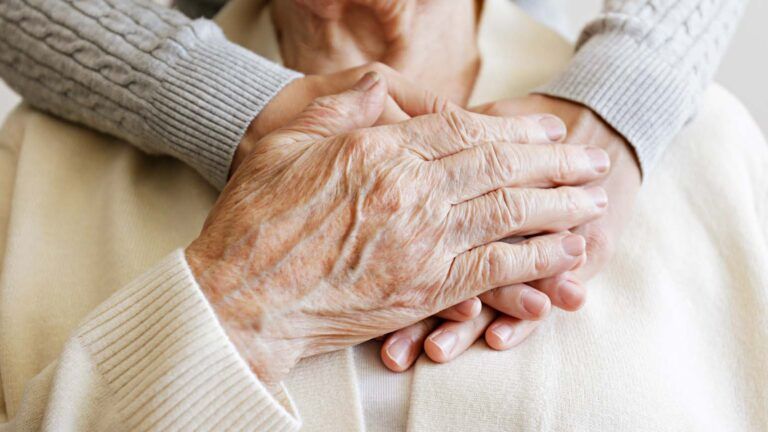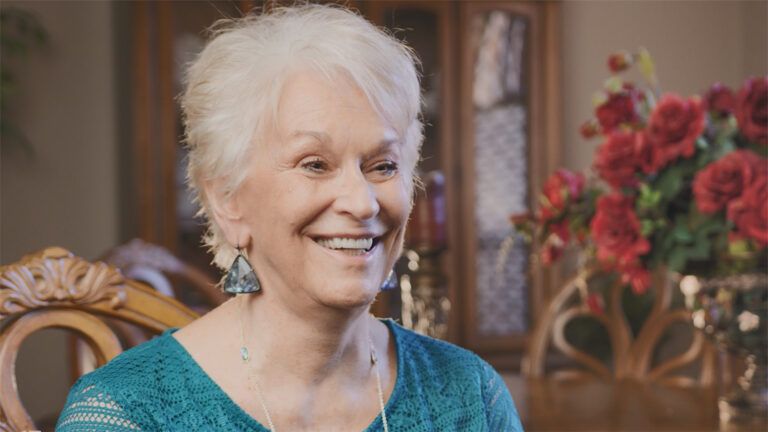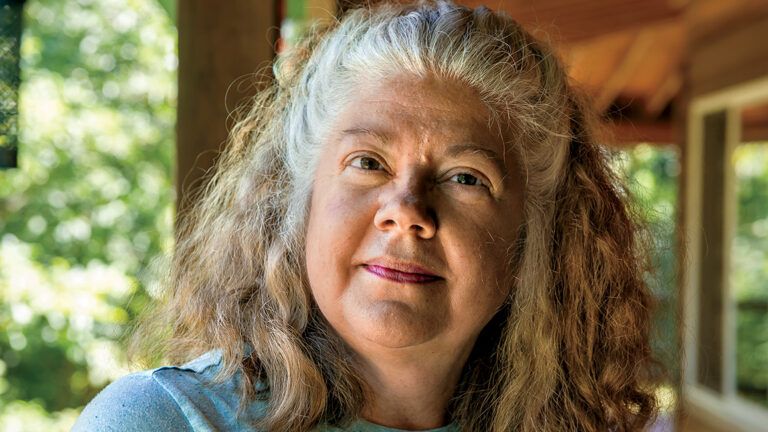Recently, I happened upon a stack of vintage suitcases filled with old journals. The one covered in pink cabbage roses took me back two decades. I opened it to find the notes I’d kept during my mother’s final battle with cancer.
As mom struggled onto the exam table, I had a sinking feeling in my gut. Dr. Huckabee’s eyes locked with mine. “We need a bone scan right away, Roberta.” I didn’t need a scan to give me the heartcrushing news. Nurses know before they know. Mom’s cancer was back.
Two decades later, my body still felt the anxiety in those words. This time there would be no cure. Only care.
But something amazing happened in the moments it took to re-read my caregiver journal. Remembering the devoted attention Mom received her last year on earth, my anxiety became peace. Joy, even. I realized that earth angels had shown up everywhere, often in the most unlikely places. As imperfect as it was, my own caregiving had been part of it all. Many of us know that keeping a journal helps to reduce stress; as an added benefit it is free and can be done anywhere (My car became my favorite spot to journal and pray). But here are four other reasons that keeping a caregiving journal can make you happier, healthier—and a more effective caregiver.
Journaling helps you let go of perfectionism.
I smiled (yes, smiled) as I gazed at the first dozen pages of Mom’s caregiver journal. My entries were written in careful calligraphy with rose-patterned stickers dotting the pages. If her nurse-daughter couldn’t be the perfect caregiver, she could at least cover her errant handwriting. An evening at Bob Evans changed my thinking. After a 10-hour shift at the hospital, I was waiting for a to-go order of Mom’s favorite chicken with noodles. “I’m utterly exhausted,” I wrote in my caregiver journal propped against the counter. “How long can I do this and juggle everything else?” As soon as I’d gotten the words down, an inner voice taunted: What kind of daughter are you anyway? I was ashamed—and quickly blotted out my blemished thinking with large floral stickers. I didn’t realize a little girl was watching: “I paste stickers on my boo-boos too,” she said with a giggle. The sheer absurdity of those stickers turned my grief into giggles. From that moment on, I put my heart on paper with no expectations for performance. And I’ve never forgotten: In journaling and in caregiving, there is no place for perfection.
Journaling helps you feel less alone.
In her eighties, Mom wasn’t a candidate for aggressive treatment. Only chemo to shrink the tumors as a pain-control measure. As an oncology and hospice nurse, I’d cared for many end-of-life patients in similar situations. I knew what her future likely held. And I’d seen it firsthand with my father, who for a full decade had battled excruciatingly-painful bone metastasis from prostate cancer. One evening I stopped to deliver my parents’ evening meal and to set up their meds. I put on a brave front, but before I backed out of their driveway, I made this entry:
What kind of a cruel joke is this, God? Now I have two parents whose cancer has spread to their bone. How much longer can I wear my I’ve-got-it-all-together mask?
Every fiber of my being wanted to be there for my parents. But I was exhausted. Angry at the unfairness of it all. Utterly alone, with not a soul I could admit it to. As I turned the key in the ignition of my Taurus, my eyes fell upon my open journal. My safe place where I could say anything. I wasn’t alone at all. My every word had been heard.
Journaling helps you prioritize.
At the time that I was busy taking my parents to medical appointments, I was also starting over at midlife after a divorce, trying to fix up a tumbledown cabin and juggling a full-time nursing job. There was no end in sight and seemingly no order to anything. Every day my mental To-Do list got longer. One Monday morning, I jotted the week’s tasks in my journal. As I wrote, there was an astonishing order to my thoughts. I was hit with a stunning realization: Some of my entries were absolutely essential—like Mom’s lab work. Others, like those special crackers Dad wanted, could wait. My journal had brought clarity to my jumbled brain. As I separated necessities from niceties, I was able to move some items to the ‘Don’t Do Now’ list. A new sense of calm revitalized me. I became a calmer caregiver too.
Journaling helps you remember the good times.
As I revisited my caregiving journals, I was startled at the pockets of joy I’d missed at the time. An entry about my father’s radiation oncologist brought a smile. Dr. Leponto had eased Dad’s pain, restored his independence, and added 12 more years to his life. He’d improved so much he got to set up at his beloved flea market and play his fiddle in their bluegrass band. Dad had been so fond of Dr. Leponto, he’d wanted a special sweater to wear when he went for his treatments. A lambswool, V-neck cardigan with patch pockets, to be exact. An L.L.Bean mail-order clerk located eight different colors in Dad’s size. My father, who’d never asked for anything in his life, settled the score from his recliner. “Didn’t have me any school clothes growing up. I want them all!” Dad’s diagnosis didn’t change—but his outlook sure did. A look back in my journals reminded me how much life was tucked inside those end-of-life moments.
Mom’s sweet smile and endearing ways. Dad’s engaging sense of humor in the worst of circumstances. Without knowing it, I’d collected moments that would sustain me forever. When we journal, not only do we get to live twice, but the life lessons are right there in black and white for us.





